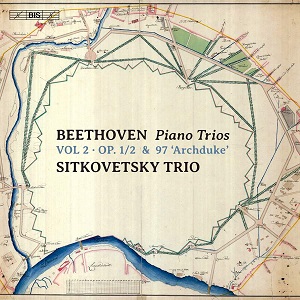
Ludwig van Beethoven (1770-1827)
Beethoven Piano Trios Vol 2
Piano Trio No 2 in G major, Op 1/2 (1793/94)
Piano Trio No 7 in B-flat major ‘Archduke’, Op 97 (1811)
Sitkovetsky Trio
rec. 2022, Bavaria Musikstudios, Munich
BIS BIS2539 SACD [80]
This was an unexpectedly difficult review to write. My first encounter with the Sitkovetsky Trio was their recording of the two Mendelssohn trios, which was absolutely dazzling (review). This was their second recording for BIS, following an all-Czech release which I felt was good but not great (review). They followed that with their first Beethoven volume which a colleague reviewed, and I caught up with them again with a pairing of Ravel and Saint-Saëns, which was very good, especially the former (review). So having missed Volume 1 of the Beethoven series, I was determined not to do so with the second, and was expecting great things.
Beethoven’s piano trios are among his more sunny works when taken as a group, and the second is one of my favourites. It is not dramatic or profound, as so many of his works are, but this is, of course, one of his first published works, written in his early twenties before his hearing loss became obvious and also before there had been too many reversals in his life. Profound it may not be, but nor is it slight, at over thirty minutes. My reference performance is that by the Florestan Trio on Hyperion (review), with TrioVanBeethoven on Gramola close behind (review). When I listened to the Sitkovetsky Trio’s performance, it failed to register as even close to these two. It lacked the energy and good-natured humour brought out by the other two, and the timings of the three seem to bear this out. The Sitkovetskys are three minutes slower than TrioVanBeethoven and over five slower than the Florestans. In taking each movement more slowly, they have drawn some of the life from the music, possibly trying to give it more gravitas than it really needs (or wants). I did check the score for the short Scherzo and each trio observed all the repeats. I am making the assumption that applies across all four movements, so isn’t an explanation for the time differences. Anyway, the tempo difference is quite apparent.
The Archduke Trio is the last Beethoven wrote, and also marked his final public performance at the piano because of his hearing loss. Contemporary reports suggest it must have been an excruciating listen. The Sitkovetskys are still slower than my two comparison versions, but their approach works better in a work where grandeur is inbuilt (the final movement excepted). Nonetheless, it still does not come up to the exalted standard of the Florestan Trio.
I am surprised at the somewhat stately approach taken by the Sitkovetsky Trio in both these works, given how exciting the Mendelssohn performances were. There is no doubt that they play well, but it seems that Beethoven isn’t an ideal fit for them. Sound quality – I could only listen in stereo – and the booklet notes are all you would expect from this label.
So I admit to being somewhat disappointed, but will still look forward to this very fine ensemble’s next (non-Beethoven) recording.
David Barker
Help us financially by purchasing from





















